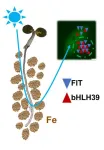(Press-News.org) COLUMBUS, Ohio – Violence against teachers is likely to be higher in schools that focus on grades and test scores than in schools that emphasize student learning, a new study has found.
Researchers surveyed over 9,000 U.S. teachers shortly before and during the height of the COVID-19 pandemic about their perception of the instructional emphasis in their schools. Participants also reported whether they had been subjected to physical, verbal or property violence – by students, parents, colleagues and/or administrators.
Results showed that a school culture focused on performance was associated with higher levels of all types of teacher-directed violence before and during COVID-19, while school emphasis on mastery of material was related to lower levels of violence aimed at educators.
“What was really striking was this performance culture predicted all kinds of increased violence by students, whether it be physical violence, verbal threatening or property violence,” said Eric Anderman, lead author of the study and professor of educational psychology at The Ohio State University.
“It wasn’t the mastery part. It was when there’s this focus on grades and test scores – ‘you’ve got to get good grades, school is all about grades’ – that’s when kids acted out against teachers.”
Given the evidence that nearly half of U.S. teachers are highly unsatisfied, the authors concluded that fostering a school culture of deep engagement in learning could make students happier and teachers safer.
The study was published online Feb. 20 in the Journal of School Violence.
Anderman and colleagues surveyed a total of 9,363 teachers of pre-K to high school classes in suburban, urban and rural districts across the United States over two time periods: between fall 2019 and March 2020, and during the 2020-2021 academic year.
Among the types of violence teachers reported included objects being thrown at them, obscene remarks or gestures directed their way, and damage to personal or classroom property. When assessing school culture, they rated such statements as “Teachers believe all students can learn,” an indication of a climate focused on mastery, or “Teachers treat kids who get good grades better than other kids,” signaling a climate focused on performance and grades.
Statistical analysis of the data controlled for numerous variables to look specifically for the link between school climate and violence directed at teachers.
In addition to those connections, the study showed that this violence didn’t stop during and shortly after the COVID-19 lockdown. About 65% of surveyed teachers reported at least one incidence of verbal threats or property damage by students before the pandemic, compared to 32% and 26% of teachers reporting similar incidents, respectively, in 2020-21. Over half of teachers reported violence by parents before COVID-19, a figure that dropped to 29% early in the pandemic.
“The rates are lower, but the rates are still there,” Anderman said. “People say no one was in schools then. That’s not true. A lot of times teachers were in the building, but the students were at home. And some of the violence occurred over Zoom.”
Student violence toward teachers was more common overall, but the study showed the same relationship trend between school culture and rates of teacher-directed violence by parents, colleagues and administrators.
“If the school was really focused on grades, you had more instances of parents, colleagues and administrators doing things that were harmful to teachers,” Anderman said. “But if the school focused on mastery – if people in school said this is a place where we really encourage kids to learn as much as they can to master material – you for the most part get less of the colleagues and parents and administrators engaging in any type of violence perpetrated against teachers.”
Anderman described a mastery climate as one in which students who take longer than a peer to solve a math equation aren’t considered worse students, and where students who perform poorly on a test might be given a do-over to try to bring up their grade. With mastery, grades still matter – but encouraging kids to really learn is the larger goal.
On the other hand, pushing students to get good grades can lead to frustration, a major predictor of aggressive behavior, he said.
“This is something we can change that doesn’t cost millions of dollars to change,” Anderman said. “This is taking time to really think about when we’re talking to kids, how much are we stressing the grades? This is about changing the way we talk to kids about what learning is about and what is really important.”
This study was part of the work of the American Psychological Association Task Force on Violence Against Teachers and School Personnel.
Co-authors included Ohio State postdoctoral researchers Andrew Perry and Hyun Ji Lee, and task force members from DePaul University; the University of California, Los Angeles; the University of North Carolina at Chapel Hill; the Center for Justice Innovation; Rutgers University; and the University of California, Berkeley.
#
Contact: Eric Anderman, Anderman.1@osu.edu
Written by Emily Caldwell, Caldwell.151@osu.edu; 614-292-8152
END
A new study identified a set of 140 genes that may help predict enhanced disease-free survival in patients with non-small cell lung cancer (NSCLC) treated with a combination of immunotherapy and low-dose radiation. The results, published in Cell Reports Medicine on Feb. 23, suggested that this “gene signature” could be used to identify a subclass of lung tumors that is more likely to be eradicated by immunotherapies.
Immunotherapy has saved countless lives but only 20 to 25 percent of patients respond to this treatment that activates a person’s ...
Psychology and Economics come together in a recent line of research, led by Ismael Rodríguez-Lara, Professor at the University of Malaga, who studies how lies affect economic decisions.
It is a study developed together with the Professor at the University of California (Santa Barbara, USA) Gary Charness, considered one of the most influential economists in the world within the experimental area, that has analyzed the way in which morality influences the degree of lying in certain economic situations. The results of this research have been published in the scientific journal Economics ...
New exploration in underwater navigation, a team from the Naval University of Engineering in Wuhan, China, has created novel algorithms that rectify inertial errors using sparse acoustic signals. This exploration offers novel method for the issue of underwater navigation , where traditional satellite systems are ineffective due to their signals' inability to penetrate water effectively.
The increasing demand for precise underwater Positioning, Navigation, and Timing (PNT) due to expanding marine exploration and activities highlights the limitations of traditional Global Satellite Navigation Systems (GNSS) ...
Thanks to the rapid progress in tiny tech, we've been mainly using microfluidics to sort tiny particles by size. But now, there's a new way to sort them by shape, which could be a big deal for medical tests and chemistry. This study shows off a new method using sound waves to separate oddly shaped particles from round ones, without needing any labels. This breakthrough could lead to better ways to deliver drugs or diagnose diseases by offering a smarter approach to sort these tiny particles.
In the realm of microfluidics, separating micro-particles based solely on size has been the norm. However, distinguishing these particles ...
Downscaling of electronic devices, such as transistors, has reached a plateau, posing challenges for semiconductor fabrication. However, a research team led by materials scientists from City University of Hong Kong (CityUHK) recently discovered a new strategy for developing highly versatile electronics with outstanding performance, using transistors made of mixed-dimensional nanowires and nanoflakes. This innovation paves the way for simplified chip circuit design, offering versatility and low power dissipation in future electronics.
In recent decades, as ...
Iron is a micronutrient for plants. Biologists from the Institute of Botany at Heinrich Heine University Düsseldorf (HHU) describe in a study, which has now been published in the Journal of Cell Biology, that regulatory proteins for iron uptake behave particularly dynamically in the cell nucleus when the cells are exposed to blue light – an important signal for plant growth. They found that the initially homogeneously distributed proteins relocated together into “biomolecular condensates” in the cell nucleus shortly after this exposure.
Both iron deficiencies and excesses are problematic for plants. They ...
Microbially induced corrosion (MIC) is a prevalent issue in marine environments, leading to structural damages such as cracking in concrete infrastructure. This corrosion poses a persistent challenge, significantly reducing the lifespan of marine structures and resulting in substantial economic losses. In response to the need for an effective solution to combat the marine corrosion on concrete, researchers of the Hong Kong Polytechnic University have developed a biomineralization approach to protect marine concrete from MIC.
Prof. ...
Certain genes associated with hypertension affect blood pressure from early in life, and they increase the risk of cardiovascular disease as you get older. However, you can do something about it.
“We are talking about really small differences, so small that they may fall within what is considered normal blood pressure. The problem is that they tend to last your whole life,” says PhD Candidate Karsten Øvretveit at the Norwegian University of Science and Technology's (NTNU) Department of ...
Washington, D.C. — Feb. 23, 2024 —Streams with ample connections to shallow groundwater flowpaths have greater microbial diversity and are more effective at preventing toxic forms of metals—often products of upstream mining—from entering and being transported downstream. These streams are also better at detoxifying those metals already present. The research is published this week in Applied and Environmental Microbiology, a journal of the American Society for Microbiology.
Under favorable conditions, the zone lining a stream channel stores nutrients and oxygen that meet nutritional and respiratory needs of local invertebrates and fish. That ...
Across the globe, more than 39 million people are living with the Human Immunodeficiency Virus (HIV), the virus that causes AIDS, including more than 1.3 million new HIV diagnoses last year. The majority of those afflicted — approximately 76% — have access to antiviral therapy that allows them to live with HIV as a chronic disease.
Sharilyn Almodóvar, Ph.D., from the Department of Immunology and Molecular Microbiology at the Texas Tech University Health Sciences Center (TTUHSC) School of Medicine and the TTUHSC Graduate School of Biomedical Sciences, said that even with the widespread ...






